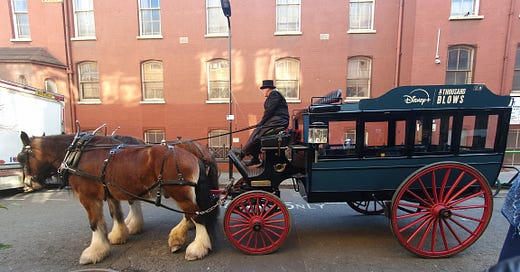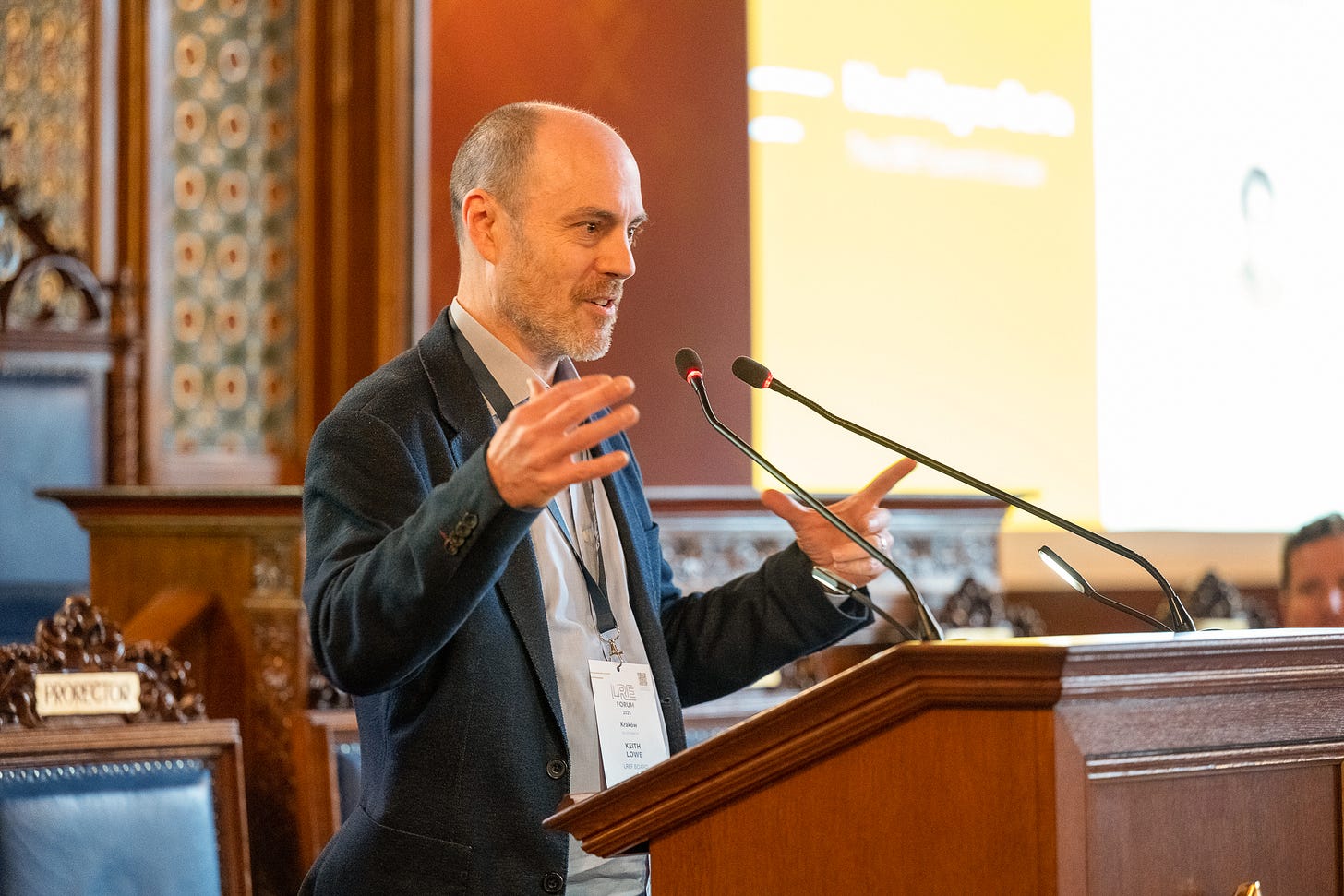As an author of history books, I get invited to all kinds of things that my younger self would never have imagined possible. I have been asked to speak at palaces, parliament buildings, museums and universities all over the world. I have been on TV. I have been on radio. I once stood on a stage, alone, delivering a TEDx talk to a live audience of 1,200. I had to pinch myself to check it was really happening.
Sometimes it seems like people are queuing up to give me a free lunch. I’ve been wined and dined in dozens of cities across three continents. Sometimes it’s a gigantic banquet in a Renaissance hall filled with crystal chandeliers; sometimes it’s in an intimate club, where invisible waiters serve eight or nine courses, each with its own wine. Occasionally there are awards thrown in. A few years ago, one of China’s biggest museums presented me with an honorary title as a “Distinguished Researcher” at their Institute. They gave me a framed certificate. Closer to home, my own local police force invited me to speak at its military history society and gave me a plaque to hang on my wall.
All of these events and perks come with the same drawback: they take up a lot of time, and there is rarely a paycheck attached. Members’ clubs want me to speak at their lunches and dinners, but rarely want to give me a fee: I am literally singing for my supper. TED talks are always unpaid. Talks at universities are also often unpaid: European universities just don’t have the same kind of money that American ones do. I often get requests from TV companies or podcast producers who want you to share your hard-earned knowledge with them, but don’t want to pay you for it.
I’m not going to complain about this here – indeed, quite the opposite. I know I’m extremely lucky. It’s a real privilege to be asked to do such things, and I can’t believe my luck every time an invitation lands in my inbox. Still, an author has to live somehow: an eight-course meal will only sustain you for so long, even if you take home a doggy bag. So this piece is all about how I choose which gigs I will do for free, and how I go about choosing.
The first few months of this year provide a good example of what I’m talking about. Since January I have been to a big, fancy lunch at the Army & Navy Club in London; a media launch for Steven Knight’s new Disney drama, A Thousand Blows; and given talks and seminars in Paris, Krakow and Naples. I have also taken on a big project coordinating a media campaign for Historians For Ukraine. Total time spent on these jobs: 19 or 20 days. Total income from these jobs: Zero.
So why do them?
The big, fancy lunch at the Army & Navy club was easy. It’s a big fancy lunch! The people there are smart and interesting. It’s local, so I don’t have to travel. A good friend of mine was going to be there, so it was an excuse to see him too. I only had to speak for 20 minutes on a subject I know backwards, so I didn’t need to prepare. Sometimes everything just aligns. So I enjoyed my very delicious meal, met some nice people, and went out with my friend afterwards. What’s not to like?
The media launch for A Thousand Blows was completely different. I had no idea what it was for, or why on earth they were asking me – the series is about bare-knuckle boxers in the nineteenth century, so it has nothing to do with anything I’m even vaguely known for. But they were offering a ride in a horse-drawn, nineteenth-century omnibus through the streets of east London, and it was a sunny day, so I went along out of pure curiosity.
To be honest, I regretted it almost as soon as I arrived. Don’t get me wrong, I’m sure it’s a great series, but it’s airing on the Disney+ channel, which I don’t even subscribe to, so I’m not likely to ever watch it. The whole afternoon was basically a waste of my time. I sat through a talk by a couple of very friendly and knowledgeable historians. Then I went for a ride on this horse-drawn bus, crammed in with a handful of journalists and social media influencers, and wondered what the hell I was doing there. At the end they gave me a goody bag with some rum in it, which I was sorely tempted to drink on my way home. Lesson learned.
Now to the travel. It sounds glamourous when I say that I’m going to Paris, Naples and Krakow to give speeches, but in reality I’m only going to see the inside of a conference room or classroom and then come home. There’s a lot of time spent in airports and trains, and a lot of admin organising it all. Sometimes it even ends up costing me money. The Paris gig, for example, offered to pay for my travel, but not my accommodation. So why put myself to all that bother?
Well, my younger sister lives in Paris, and my older sister lives not too far from Naples in Italy, so both trips were actually a good excuse to visit family. It also feels really worthwhile talking to students at these universities – after all, they are the historians of the future. The professor in Paris who asked me along is also a friend, and I owe him a couple of favours. The professor in Naples also seemed like a good guy, and I love that city so much that it’s always good to make new friends there. Working for free is much less onerous if it feels like you’re doing something worthwhile, and getting to spend time with people that you genuinely like.
The trip to Krakow was something else altogether. I am on the Historical Advisory Board for the LRE Foundation – an unpaid role – and Krakow was where they were having their annual conference. This organisation does great work promoting the memory and history of the Second World War, so it’s an honour to work with them. Again, it’s all about the people. I have yet to meet someone connected to LRE who I did not like, so I don’t mind giving up a few days for them.
While I was at the conference, I spoke with a whole group of other historians about the ongoing crisis in Ukraine. We were all deeply concerned about the sheer quantity of disinformation that is being spread by Russia, and repeated in influential circles in the USA – particularly historical disinformation. We all decided that something should be done about it: after all, if historians don’t stand up for historical truth, how can we expect anyone else to?
Given that someone needed to coordinate our collective action, I volunteered. Since then I have been spending a great deal of my time engineering a campaign amongst historians around Europe and beyond. (Expect to see something more about this in the coming weeks.) All of this is unpaid, but do I care? Of course not. Some things in life have nothing to do with money, and this is one of them.
Finally, there is this platform. I’m only just starting out on Substack, so most of my readers are on the unpaid tier – and that’s ok. I’m building something here, slowly, and this is a good way to reach out to you all. I’m just happy you’re all willing to read my stuff. (That said, if you felt like upgrading… please don’t let me stop you!)
I liken starting on Substack to setting up a new business: unless you’re really lucky, you have to expect to make a loss in your first year. This is my new business, and I’m still learning. (Incidentally, feel free to contact me if you have any suggestions. I don’t mind a bit of constructive criticism!)
The long and the short of it is that, when you’re an author, unpaid work is just part of the territory. If you add up all the time I’ve spent doing the things above, I’ve probably worked a good month for free already this year. I haven’t even mentioned all the podcasts I’ve been doing – again for free, because they are promoting my new book.
Despite all this, you won’t catch me complaining. Nobody does this job with the illusion that it’s going to make them rich. As long as I can still put food on the table, I’ll continue to do the unpaid gigs along the way – because it’s fun. And that, to my mind, is just as important as any paycheck.





